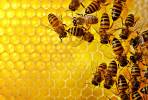Not all insects are bad guys
Southern Nevada homes and gardens rarely need to face infestations of insect pests. There are certainly exceptions, as anyone trying to control aphids, squash bugs and leaf-footed bugs knows too well. Still, it seems that we Americans have been taught to look at insects as “the enemy.”
As a result, we have developed the unfortunate tendency to respond to all of them with pesticides, which often does more harm than good. I am not saying that we do not need to control termites, since they can be real home wreckers. I readily admit my tolerance for cockroaches and houseflies is low, although my colleague ML Robinson calls them lizard food.
Although some insects are pests, it is important to recognize that most are not and have nothing to do with us. More importantly, a large number of insects benefit humankind and we would be much worse off without them. Presidents (and good farmers) Washington and Jefferson kept insectaries to improve and protect their crops.
Many of our food crops rely on bees and other insects for pollination. Pumpkin flowers cannot yield pumpkins without pollination, almost always done by bees. The same is true for apples and other food plants.
If you see perfectly round or oval cutouts in the leaves of your landscape plants, be happy! You probably have leafcutter bees, among our most important native pollinators. They do not eat the leaf pieces, but use them to line the nests of their offspring. Let us look at our scalloped leaves as our part of keeping the pollinator population healthy.
When pollinator insects are in trouble, many crop plants are in trouble, too. Ultimately, we, who sit at the top of the food chain, also lose out.
Food is not the only place where insects perform a valuable service. The flowers that we find so attractive, that we spend time and money on, did not become beautiful because we like them. Many of the shapes, colors and scents of flowers came into existence as a way of luring insects. By directing an insect to a site where it can get delicious nectar, the flower has a way to spread and receive its pollen. In this way, the flowers produce seeds and the species continues.
A large number of insects actually kill off other, pesky ones. In many cases, using these predators is a safe alternative to pesticides, and you can find many of them for sale in garden supply catalogs.
Ladybugs, which everyone has seen, feast happily on aphids. Most people probably know about praying mantises, which feed on a wide range of other insects. If you spend any time near standing water, you have probably seen dragonflies and damselflies. These delicate-looking creatures dine on mosquitoes and other flies.
There are many of these beneficial predators; ground beetles control soil-borne pests. They come out at night to feed, so you may not even know they are out there, working for you.
Syrphid flies, or hover flies, appear much like little bees. Their larvae devour aphids, young termites and ants.
Lacewing adults eat pollen, but their offspring are known as “aphid lions.” Available online, they also consume spider mites and thrips, as well as other pests. And of course, spiders (including black widows) feed almost exclusively on insects.
Because we depend on certain insects to keep our environment alive, we need to be careful when using sprays and chemicals. Most commercial insecticides kill across the board. They cannot differentiate among a butterfly, a bee or a pest. Apply pesticides with care, to avoid causing harm to people, animals and water sources.
Some insect pests also reproduce several times per year, hence they may develop resistance to insecticides within a relatively short time interval.
If you feel that you must use one of the many products on the market, read the label completely and carefully, and follow the directions to the letter.
It is possible to lure beneficial insects into gardens and yards, and encourage them to stay around. For example, ladybugs that have been purchased will often leave as soon as they have finished their prey, or they try to return to the site where they were first collected.
Dick Post, the former director of Northern Nevada Extension suggests having a pile of pine needles in the garden may encourage the ladybugs to remain.
Certain herbs, coriander, dill, parsley and fennel seem to be particularly attractive to beneficial insects. Clover, alfalfa and yarrow are also popular. Having a wide range of attractor plants around and in bloom will help keep a population of beneficials in your yard.
A large number of these insects make their home in Southern Nevada, and you can get more information on them by calling the Master Gardener help line.
Angela O’Callaghan is the Social Horticulture Specialist for University of Nevada Cooperative Extension. Contact ocallaghana@unce.unr.edu or 702-257-5581.























